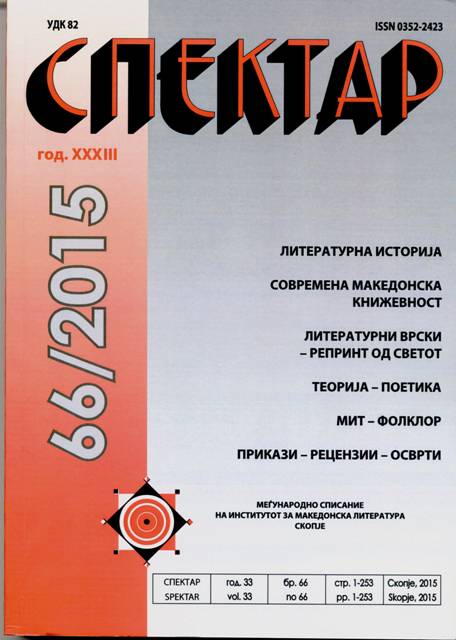ХЕТЕРОЛОШКИТЕ АСПЕКТИ НА РОМАНОТ БАЈАЗИТ И ОЛИВЕРА ОД ДРАГИ МИХАЈЛОВСКИ
HETEROLOGICAL ASPECTS OF THE NOVEL BAYEZID AND OLIVERA BY DRAGI MIHAJLOVSKI
Author(s): Ranko MladenoskiSubject(s): Language and Literature Studies, Literary Texts
Published by: Институт за македонска литература
Keywords: heterology; culture; otherness; Christianity; Islam; Dragi Mihajlovski; Bayezid I; Olivera Lazarevik
Summary/Abstract: In this paper we analyze and interpret the structural elements of the novel Bayezid and Olivera by Dragi Mihajlovski which refer to the interaction of different cultures. First we offer the most general theoretical postulates of heterology (or xenology) as the science of Otherness, i.e. diversity, and we define the basic terminology tools necessary for this type of interpretation, such as: dialogism, intercultural communication, colonial entity (colonizing entity and colonized entity), cultural semiospheres, Eurocentrism (Orientalism), superiority, inferiority, nationalism, exoticism and the like. In the applicative part of the paper, we elaborate on the narrative segments of the novel concerning the intercultural dialogue between Europe – Asia, i.e. Serbia - Ottoman Empire, using as a starting point the marriage between the Serbian princess Olivera Lazarevik and the Turkish sultan Bayezid I. In the interpretation of these parts of the novel we take into account the civilization differences in this hybrid polygamic environment which are numerous and affect the most essential categories that make up the cultural identity - language, religion, ethnicity, nationality. However, the paper also analyzes the multicultural aspects of the narrative of the novel because many cultures such as Serbian, Turkish, Macedonian, Tatar, Persian etc. come into contact in some parts of the novel.
Journal: Спектар
- Issue Year: 2015
- Issue No: 66
- Page Range: 98-108
- Page Count: 11
- Language: English, Macedonian

